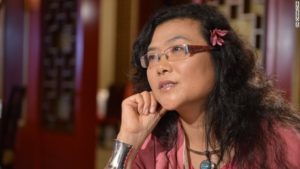 |
| Zhang Lijia |
Zhang Lijia:
Scientists have established a link between the emergence of highly pathogenic bird flu viruses and the intensification of poultry production systems. In his 2016 book, Big Farms Make Big Flu, biologist Rob Wallace tracks the ways influenza and other pathogens emerge from an agriculture controlled by multinational corporations in developed countries.More in the South China Morning Post.
Chicken and other poultry are packed into mega-barns, grown out in a few months, slaughtered, processed and shipped all over the world. If a virus emerges, it can race through a flock packed together without any resistance. If it then spills over into humans, the consequences are dire.
All these problems at home and abroad are proof that nature has been interfered with, as humans go against the natural order. This is a good time to revisit the philosophical aspects of Taoism.
The Tao-te Ching says: “Man takes his law from the Earth; the Earth takes its law from Heaven; Heaven takes its law from the Tao. The law of the Tao is its being what it is.” In the eyes of Taoists, mankind and nature are bound together in an organic chain, and therefore in a relationship of reciprocity. If nature is in agreement with mankind, the world is harmonious and prosperous. If nature is mistreated by mankind, it can retaliate by causing calamitous suffering.
So far, two million people around the world have been infected with Covid-19, and millions more have been affected by the pandemic and lockdowns. This is a shrill wake-up call. The world must respond to it.
After the Covid-19 outbreak began in China, the authorities issued a temporary ban on wildlife trade, shutting down nearly 20,000 farms raising peacocks, porcupines, ostriches and other animals. Then a permanent ban on wildlife trade and consumption was announced, but with exceptions for trade for fur, medicine or research.
Some conservationists fear that traffickers might exploit these potential loopholes to continue trading wildfire. Still, the ban is a big step forward in the right direction.
The West doesn’t give China enough credit for its green leadership.
For years, international conservation groups have criticised the way China regarded wild animals as commodities. Corruption has also made it that much harder to police the illegal trade of live wildlife. Biodiversity loss is severe in China, where 61 percent of wild animals face extinction.
The prevention of future global pandemics must be a collective effort by people from around the world, but what China chooses to do is crucial to this battle. We will have to address the roots of the problem – the destruction of our environment – and shift our development model away from an overemphasis on economic benefits towards an environmentally sustainable model.
China’s air and water quality significantly improved during coronavirus pandemic lockdown. Sustainable development is a relatively new idea. Interestingly, Taoism, in its creed and practice, is compatible with sustainable development: notably, it is deeply concerned about harmony with nature, and nature’s ability to provide for mankind’s present and future needs.
Naturally, no religion or philosophy alone can resolve an environmental crisis or a pandemic. But if we are able to hermeneutically reconstruct Taoist teachings and reintegrate them into our culture, we may benefit greatly from ancient wisdom.
Take, for example, the issue of vegetarianism. Although the two main schools of Taoism hold different views on this, the religion generally encourages devotees to avoid meat and minimise harm, because animals are sentient beings. Just imagine how much good it would do the environment if 1.4 billion people could cut their meat intake by half!
Zhang Lijia is a speaker at the China Speakers Bureau. Do you need her at your meeting or conference? Do get in touch or fill in our speakers' request form.
Are you looking for more experts on cultural change in China at the China Speakers Bureau? Do check out this list.
No comments:
Post a Comment